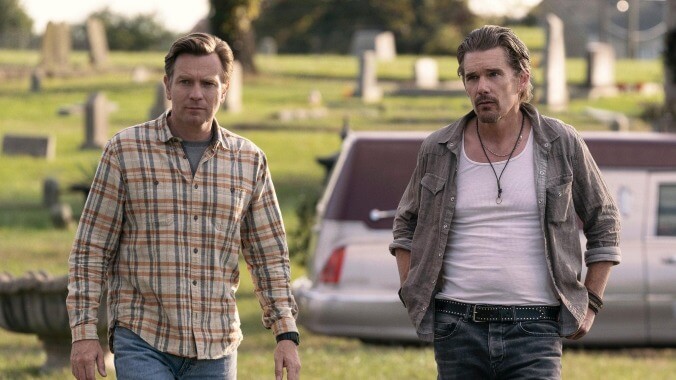Raymond And Ray's central imbalance doesn't derail its patient pleasures
Despite director Rodrigo Garcia's confident direction, Ethan Hawke and Ewan McGregor fare unevenly as brothers who reunite to lay their father to rest

For much of his undervalued filmmaking career, writer-director Rodrigo García has focused on what classical Hollywood studio executives used to call “women’s pictures”: Melodramas centered on the romantic and domestic travails of female characters who have arrived at a point of crisis or uncertainty. Working within the independent film realm, García doesn’t land the cushier studio budgets that Golden Age “women’s picture” practitioners like George Cukor or William Wyler would, but in films like the anthology portrait Nine Lives and the moving adoption drama Mother And Child, he handily compensates with an observant eye for detail and a hushed, lived-in sense of emotional intimacy.
Considering that his last film, the detox downer Four Good Days, found García uncharacteristically indulging in shrill, over-the-top histrionics while still sticking to the female-centered fare blueprint that has worked so well for him before, it makes sense creatively for him to attempt a sea change. And not only is his newest film, Raymond And Ray, a total 180-degree turn in being primarily about two men, the estranged pair of half-brothers referred to in the movie’s title (and played by Ewan McGregor and Ethan Hawke), but it’s also concerned with the psychologically and culturally insidious force of toxic masculinity on a fundamental level. As Raymond (McGregor) and Ray (Hawke) reunite once the abusive father they shared dies, one of the questions they’re forced to confront is how to break the cycle of pain and torment into which he indoctrinated them.
The brothers’ adult lives each bear the long-lasting imprint of that childhood trauma in vastly differing ways—Raymond is a repressed bureaucrat whose fussy adherence to rigid routines has led to two divorces, while Ray is a wild, rebellious former heroin addict with a gift for charming every woman he meets and an inability to hold down a steady job. Naturally, then, this oil-and-water dynamic informs the pair’s bickering banter as they set out together to find out their dad’s funeral arrangements, though the two are united in feeling more relief than pure grief over the old man’s passing. Once they arrive in their father’s resting place of Richmond, Virginia, they’re hit with disorienting surprises: the will stipulates that the two must carry out the physical labor of digging their dad’s grave and burying him together, and the appearance of their father’s younger, free-spirited final lover Lucia (Maribel Verdú) and caring nurse Kiera (Sophie Okonedo), both of whose embrace of the deceased as a great man goes against their own bitter memories of the man who raised them.
A surprising amount of the film takes place in the cemetery where Ray and Raymond toil at burying their dad, while an array of colorful supporting characters (including not just Lucia and Kiera, but also a pragmatic reverend played by Vondie Curtis-Hall and a constantly fretting funeral home director played by Todd Louiso) keeps them company. But that’s hardly a complaint, since for García’s low-key approach to character drama, patience is definitely a virtue. There are a few unfortunate instances of Four Good Days-style melodrama here, including an utterly gratuitous variation on Chekhov’s Gun, but for the most part, Raymond And Ray reaffirms the filmmaker’s command of gentle, emotionally complex human portraiture. Like any true humanist director, García is a warm, attentive listener, and there’s considerable pleasure in watching the title characters work through whether it’s possible to forgive someone whose best self they never really knew in believably unhurried fashion.
But one thing that Garcia has never shown signs of possessing is a skill for comedy, which proves to be a liability here. It’s admirable that he aims to counterbalance the death-shrouded thematic heaviness with light irreverence, but little of the humor, whether it takes the verbal form of the brothers’ ribbing of each other or veers into physical comedy with a whimsical visit from twin acrobats, really lands. It’s easy to be disarmed by such attempts, but impossible to genuinely laugh at them.
There’s also an imbalance in the writing of the two lead characters that effectively leaves one-half of its irresistible-on-paper star pairing high and dry. Raymond feels so caricatured in his stiff anal-retentiveness that McGregor can do little to rehabilitate the characterization; having to tamp down his roguish charisma, the actor comes off as seeming uncomfortable. Hawke, on the other hand, has no such limits on his charisma in playing a much more multi-faceted, human character. He’s especially great opposite Okonedo as Ray and Kiera form an affecting bond, and having Ray be a former trumpet prodigy is a neat callback to the actor’s portrayal of Chet Baker in the biopic Born To Be Blue. So while Raymond And Ray registers nicely as a relaxed, compassionate character study, there’s no denying that one of the two central characters being studied hugely outshines the other.